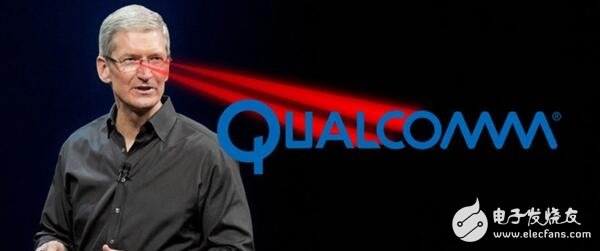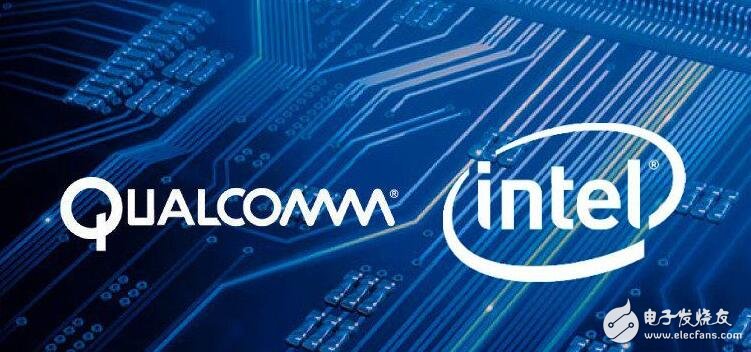Editor's note: Recently, Qualcomm's troubles have continued. On May 8th, the patent dispute between Qualcomm and Apple continued to escalate. Apple has refused to pay patencies to Qualcomm. Qualcomm also expressed dissatisfaction and plans to prevent the US from importing iPhones, thereby increasing the cost of the iPhone in the US market. , counterattack pressure on Apple. On May 14, according to foreign media Engadget, this month Intel and Samsung jointly submitted materials to the court to support the FTC to sue Qualcomm, saying that Qualcomm used its dominant position in the mobile processor industry to crowd out industry rivals. On May 8th, the dispute over the patent fees between Qualcomm and Apple continued to escalate. The incident continued to ferment, and the words of the two sides did not seem to compromise. Apple has refused to pay patencies to Qualcomm, and Qualcomm is also dissatisfied. It plans to stop the US from importing iPhones, thereby increasing the cost of the iPhone in the US market and countering the pressure on Apple. Cook publicly expressed his dissatisfaction with Qualcomm's charge for the use of patent privilege, and for example, "Qualcomm insists on levying fees on some technologies that Apple does not have with its patents, just as sofa sellers charge different fees for the size of the buyer's living space. The more innovation Apple has, the more patent fees Qualcomm will charge.†Apple said that Qualcomm’s behavior is malicious “two-way chargingâ€. According to US media reports, when asked last week why Apple did not pay royalties to its mobile phone's baseband chip maker Qualcomm, Cook did not mention anything. Until again asking about Apple's second quarter revenue, Cook responded to this question: We could not pay Qualcomm any fees until Apple and Qualcomm's patent disputes were resolved. On this day, Apple Inc. shares rose 3.2% on May 8 to a record high of $153.70, according to the intraday high, plus the total number of shares outstanding by 5.21 billion shares as of March 31. Apple's market value rose to 801.37 billion US dollars, becoming the first US company with a market capitalization of 800 billion US dollars. It is also the world's highest market value company. On May 12, Apple's share price hit another new high of $156.42, closing at a market value of $819.95 billion. Berkshire Hathaway, a billionaire investor, Buffett disclosed in a regulatory filing that the company held $19.2 billion in Apple stock in the first quarter (as of March 31), much higher than the previous year. The fourth quarter (as of December 31) was $7.1 billion. Because Foxconn and Qualcomm's patent licensing agreement expired, Apple hopes to continue Foxconn's previous model, and to copy to Wistron, and Qualcomm's appeal is to refuse to renew Foxconn with the hope of signing directly with Apple. Or even if you renew your contract with Foxconn, you must follow the latest version of the OEM/ODM patent license agreement. Another reason why Apple sued Qualcomm is the introduction of Intel, the second supplier of iPhone baseband. Intel has publicly stated that the use of Intel baseband is not subject to royalty fees, including Qualcomm’s patent fees. This is recognized by Apple. Qualcomm certainly does not recognize Apple. The introduction of Intel's baseband solution is to compete with Qualcomm. According to Qualcomm, Apple even "does not fully utilize the performance of Qualcomm modem chips in its iPhone 7 mobile phone", that is, to reduce the performance of Qualcomm baseband chips to achieve performance with Intel baseband chips. match. It is too early to assert that Qualcomm Apple is victorious. Given Qualcomm's core position in the communications field, Apple can't abandon Qualcomm chips. If Apple completely abandons Qualcomm chips, it will only lead to Qualcomm's more fierce patent litigation. The purpose of the Apple lawsuit is to minimize the payment of Qualcomm's patent fees. Qualcomm counterclaimed Apple, on the one hand, hopes to directly sign a patent licensing agreement with Apple, and on the other hand, it is also forcing Apple to return to the negotiating table as soon as possible. The probability of future reconciliation between the two sides is still the greatest. According to foreign media Engadget, this month Intel and Samsung jointly submitted materials to the court to support the FTC to sue Qualcomm, saying that Qualcomm used its dominant position in the mobile processor industry to crowd out industry rivals. Intel said that Qualcomm is unfairly competing by abusing patents and business practices. The reason for Samsung is that Qualcomm refused to authorize the necessary technology, which led to the obstruction of its own Exynos processor. In addition, the litigation dispute between Qualcomm and Apple has not yet ended. Now Apple, Samsung, and Intel have stood on the same echelon and roared at Qualcomm. Electric Deep Fryer With Timer Deep Fryer With Timer,Deep Fat Fryer No Oil,Multi Function Air Fryer,Commercial Electric Deep Fryer Ningbo ATAP Electric Appliance Co.,Ltd , https://www.atap-airfryer.com
According to foreign English reports, Apple sued Qualcomm. On the one hand, Qualcomm hopes to change the previous patent licensing model and requires direct authorization from Apple. Although Apple has reduced the patent expenses by paying royalties through Foxconn, it is invisibly bound by Foxconn. In recent years, Apple has added new iPhone OEM partners such as Wistron, but Foxconn has always been the main agent of the iPhone. It is an indisputable fact. It is particularly important to point out that the patent license agreement signed by Foxconn and Qualcomm is definitely not wanting or Copying to Wistron, this is what Apple calls Qualcomm "refusal to provide licenses to certain standard technology implementers." 
September 17, 2022